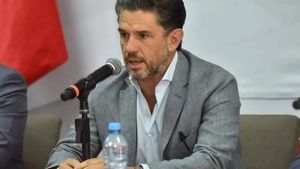Netflix has recently released a new docuseries titled Bad Influence: The Dark Side of Kidfluencing, which has sparked intense discussions around the troubling realities of child influencers. This comes on the heels of another controversial documentary, Devil in the Family: The Fall of Ruby Frank, which exposed abusive behaviors towards children in the influencer space. The new series focuses on allegations made by former members of Piper Rockelle's Squad, revealing a darker side to the glamorous world of social media fame.
At the heart of Bad Influence are shocking claims against Tiffany Smith, Piper Rockelle's mother and manager, who is accused of exploiting her daughter and other young influencers for profit. The docuseries, created by Kief Davidson, features interviews with former Squad members and their parents, painting a picture of a toxic environment where children were allegedly subjected to physical and emotional abuse.
The formation of the Squad in 2018 initially seemed like a harmless venture, as it consisted of Piper and her friends creating skits and videos together. However, the situation reportedly escalated when Tiffany and her partner, Hunter Hill, began imposing grueling work schedules on the children, often exceeding 12 hours a day. These revelations have culminated in a lawsuit filed against Tiffany by 11 former Squad members, which has only intensified the scrutiny surrounding the family.
Piper Rockelle, now 17, has been part of the influencer scene since she was eight years old. Despite the controversies, she continues to post content for her 12.1 million YouTube subscribers. However, due to the allegations against her mother, Piper has been banned from monetizing her YouTube channel. Instead, she relies on her significant followings on Instagram (6.2 million) and TikTok (15 million) for income through brand deals.
In the wake of the docuseries, Piper has expressed her struggles with mental health, noting that the public scrutiny has taken a toll on her well-being. "This rumor, unfortunately, has kind of hurt my lifestyle in a lot of ways, but I've just kept going as much as I possibly can," she stated in an Instagram video. Despite the allegations against her mother, Piper continues to publicly support Tiffany, claiming her innocence and denouncing the accusations as untrue.
While Piper navigates her online presence, Tiffany Smith appears to be living a quieter life, having reached a $1.85 million settlement with the plaintiffs involved in the lawsuit. Although she was never criminally charged, the settlement aimed to prevent her from continuing any harmful behavior towards child influencers. Many observers argue that Tiffany's actions have not only affected the former Squad members but have also placed Piper in a precarious position, as her mother reportedly continues to control her content.
The docuseries sheds light on the complexities of the influencer economy, particularly concerning the exploitation of minors. Experts featured in Bad Influence discuss the lack of legal protections for child influencers, highlighting how Tiffany was able to create a working environment devoid of oversight, leading to allegations of abuse and exploitation.
Among the former Squad members who have come forward, Claire and Reese RockSmith, Piper's cousins, shared their experiences of growing up in the Squad. They described how Tiffany's increasingly erratic behavior during filming led to their decision to leave. Corinne Joy, another former member, recounted her own traumatic experiences, including being subjected to bullying and harassment following her departure from the Squad.
Other former Squad members, such as Sophie Fergi and Sawyer Sharbino, also revealed the pressures they faced while creating content. In the docuseries, Fergi described how the group was often forced to film up to 15 videos a day, leading to exhaustion and emotional distress. Sharbino shared how he felt manipulated by Tiffany and how the environment became toxic, with children being encouraged to act inappropriately on camera.
The docuseries highlights the alarming reality of child influencers, who often find themselves in a precarious position as they juggle fame, work, and their personal lives. As the series gains popularity, it raises critical questions about the responsibilities of parents and managers in the influencer industry, and the need for stricter regulations to protect young creators.
As the narrative unfolds, it becomes clear that while the internet offers opportunities for fame and success, it can also expose children to significant risks. Bad Influence serves as a cautionary tale, urging parents and guardians to safeguard their children from the potential pitfalls of online fame.
In conclusion, Bad Influence: The Dark Side of Kidfluencing not only chronicles the rise and fall of Piper Rockelle's Squad but also serves as a broader commentary on the implications of child stardom in the digital age. As society grapples with these issues, it remains crucial to advocate for the welfare of young influencers, ensuring that their rights and well-being are prioritized over profit.







